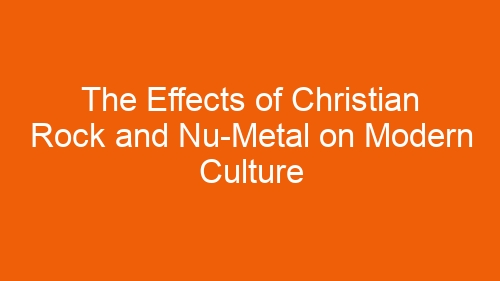-
Table of Contents
Influence of Christian Rock and Nu-Metal on Youth Culture
Christian rock and nu-metal are two genres of music that have had a significant impact on modern culture, particularly on youth culture. Both genres have their own unique characteristics and messages that have resonated with young people around the world. In this article, we will explore the effects of Christian rock and nu-metal on modern culture and how they have influenced the beliefs, attitudes, and behaviors of young people.
Christian rock is a genre of music that combines rock and pop elements with Christian lyrics and themes. It emerged in the 1960s and has since grown in popularity, with many Christian rock bands achieving mainstream success. The genre has been praised for its positive messages and uplifting themes, which often focus on faith, hope, and love. Christian rock has provided young people with an alternative to mainstream music that promotes values such as kindness, compassion, and forgiveness.
One of the key effects of Christian rock on modern culture is its ability to inspire and motivate young people to live out their faith in a meaningful way. The music encourages listeners to reflect on their beliefs and values and to strive to make a positive impact on the world around them. Christian rock has also been credited with helping young people develop a sense of community and belonging, as they connect with others who share their faith and values through music.
Nu-metal, on the other hand, is a genre of music that emerged in the late 1990s and combines elements of heavy metal, hip-hop, and alternative rock. Nu-metal is known for its aggressive sound and dark themes, which often explore topics such as anger, frustration, and alienation. The genre has been criticized for its violent lyrics and negative messages, but it has also been praised for its raw energy and emotional intensity.
The effects of nu-metal on modern culture are complex and multifaceted. On one hand, the genre has been associated with rebelliousness and nonconformity, as young people are drawn to its edgy sound and provocative lyrics. Nu-metal has provided a voice for those who feel marginalized or misunderstood, allowing them to express their emotions and frustrations through music. However, the genre has also been linked to issues such as substance abuse, self-harm, and mental health problems, as some listeners may struggle to cope with the intense emotions and dark themes present in nu-metal music.
Despite their differences, both Christian rock and nu-metal have had a profound impact on modern culture and have influenced the beliefs, attitudes, and behaviors of young people in various ways. Christian rock has provided a positive and uplifting alternative to mainstream music, encouraging young people to live out their faith and values in a meaningful way. Nu-metal, on the other hand, has given a voice to those who feel marginalized or misunderstood, allowing them to express their emotions and frustrations through music.
In conclusion, Christian rock and nu-metal have both played a significant role in shaping modern culture and influencing the beliefs, attitudes, and behaviors of young people. While Christian rock promotes positive messages of faith, hope, and love, nu-metal explores darker themes of anger, frustration, and alienation. Both genres have their own unique characteristics and messages that have resonated with young people around the world, making them important cultural forces in today’s society.
Evolution of Christian Rock and Nu-Metal in Mainstream Music
Christian rock and nu-metal are two genres of music that have had a significant impact on modern culture. Both genres have evolved over the years, blending elements of rock, metal, and Christian themes to create a unique sound that has resonated with audiences around the world.
Christian rock first emerged in the 1960s and 1970s as a response to the growing popularity of rock music. Bands like Petra and Stryper were among the pioneers of the genre, combining catchy melodies with lyrics that reflected their Christian faith. Over the years, Christian rock has continued to evolve, with bands like Switchfoot and Skillet gaining mainstream success while staying true to their Christian roots.
Nu-metal, on the other hand, emerged in the late 1990s and early 2000s as a fusion of heavy metal, hip-hop, and alternative rock. Bands like Korn, Limp Bizkit, and Linkin Park were at the forefront of the nu-metal movement, blending aggressive riffs with rap-influenced vocals to create a sound that was both heavy and melodic. Nu-metal quickly gained popularity among young audiences, with its angst-ridden lyrics and energetic performances resonating with a generation that was grappling with issues like identity, alienation, and social injustice.
Despite their differences, both Christian rock and nu-metal have had a profound impact on modern culture. These genres have provided a platform for artists to explore themes of faith, spirituality, and personal struggle in a way that is both authentic and relatable. By blending elements of rock and metal with Christian themes, these genres have challenged traditional notions of what constitutes “religious” music, opening up new possibilities for artists to express their beliefs in a way that is relevant to contemporary audiences.
One of the key effects of Christian rock and nu-metal on modern culture has been their ability to reach a diverse audience. Both genres have attracted fans from a wide range of backgrounds, including Christians and non-Christians alike. This crossover appeal has helped to break down barriers between different musical communities, fostering a sense of unity and shared experience among listeners who may not have otherwise interacted.
Another effect of Christian rock and nu-metal on modern culture has been their influence on mainstream music. Both genres have inspired countless artists across a variety of musical styles, from pop to punk to electronic dance music. The raw emotion and honesty of Christian rock and nu-metal have served as a source of inspiration for artists looking to push the boundaries of their own creativity and connect with audiences on a deeper level.
In conclusion, Christian rock and nu-metal have had a lasting impact on modern culture, shaping the way we think about music, faith, and identity. These genres have provided a platform for artists to explore themes of spirituality, personal struggle, and social justice in a way that is both authentic and relatable. By blending elements of rock and metal with Christian themes, Christian rock and nu-metal have challenged traditional notions of what constitutes “religious” music, opening up new possibilities for artists to express their beliefs in a way that is relevant to contemporary audiences. As these genres continue to evolve and inspire new generations of artists, their influence on modern culture is sure to endure for years to come.
Controversies Surrounding Christian Rock and Nu-Metal in Modern Society
Christian rock and nu-metal are two genres of music that have sparked controversy and debate in modern society. Both genres have had a significant impact on popular culture, influencing the way people think, feel, and behave. However, the effects of Christian rock and nu-metal on modern culture are complex and multifaceted, with both positive and negative consequences.
Christian rock, also known as contemporary Christian music, is a genre of rock music that incorporates Christian themes and lyrics. It has gained popularity in recent years, with many Christian rock bands achieving mainstream success. Proponents of Christian rock argue that it provides a positive alternative to secular music, offering listeners a message of hope, faith, and redemption. They believe that Christian rock can inspire and uplift people, helping them to connect with their spirituality and deepen their relationship with God.
On the other hand, critics of Christian rock argue that it is too commercialized and lacks authenticity. They believe that many Christian rock bands are more concerned with making money than spreading the message of Christianity. Some critics also argue that Christian rock promotes a narrow and exclusionary view of Christianity, alienating those who do not adhere to traditional Christian beliefs. Despite these criticisms, Christian rock continues to be a popular genre of music, with a dedicated fan base and a strong presence in the music industry.
Nu-metal, on the other hand, is a genre of music that combines elements of heavy metal, hip-hop, and alternative rock. It emerged in the late 1990s and early 2000s, with bands like Linkin Park, Korn, and Limp Bizkit leading the way. Nu-metal is known for its aggressive sound, angsty lyrics, and rebellious attitude. Proponents of nu-metal argue that it provides an outlet for young people to express their frustrations and emotions, helping them to cope with the challenges of adolescence and young adulthood.
However, critics of nu-metal argue that it promotes violence, misogyny, and substance abuse. They believe that the aggressive and confrontational nature of nu-metal can have a negative influence on young listeners, encouraging them to engage in destructive behaviors. Some critics also argue that nu-metal perpetuates negative stereotypes about mental health and masculinity, reinforcing harmful societal norms. Despite these criticisms, nu-metal remains a popular genre of music, with a loyal fan base and a lasting impact on popular culture.
In conclusion, the effects of Christian rock and nu-metal on modern culture are complex and nuanced. Both genres have had a significant impact on popular culture, influencing the way people think, feel, and behave. While Christian rock offers a message of hope and redemption, nu-metal provides an outlet for young people to express their frustrations and emotions. However, both genres have faced criticism for promoting harmful stereotypes and behaviors. Ultimately, the impact of Christian rock and nu-metal on modern culture is a reflection of the diverse and ever-changing nature of society.




















